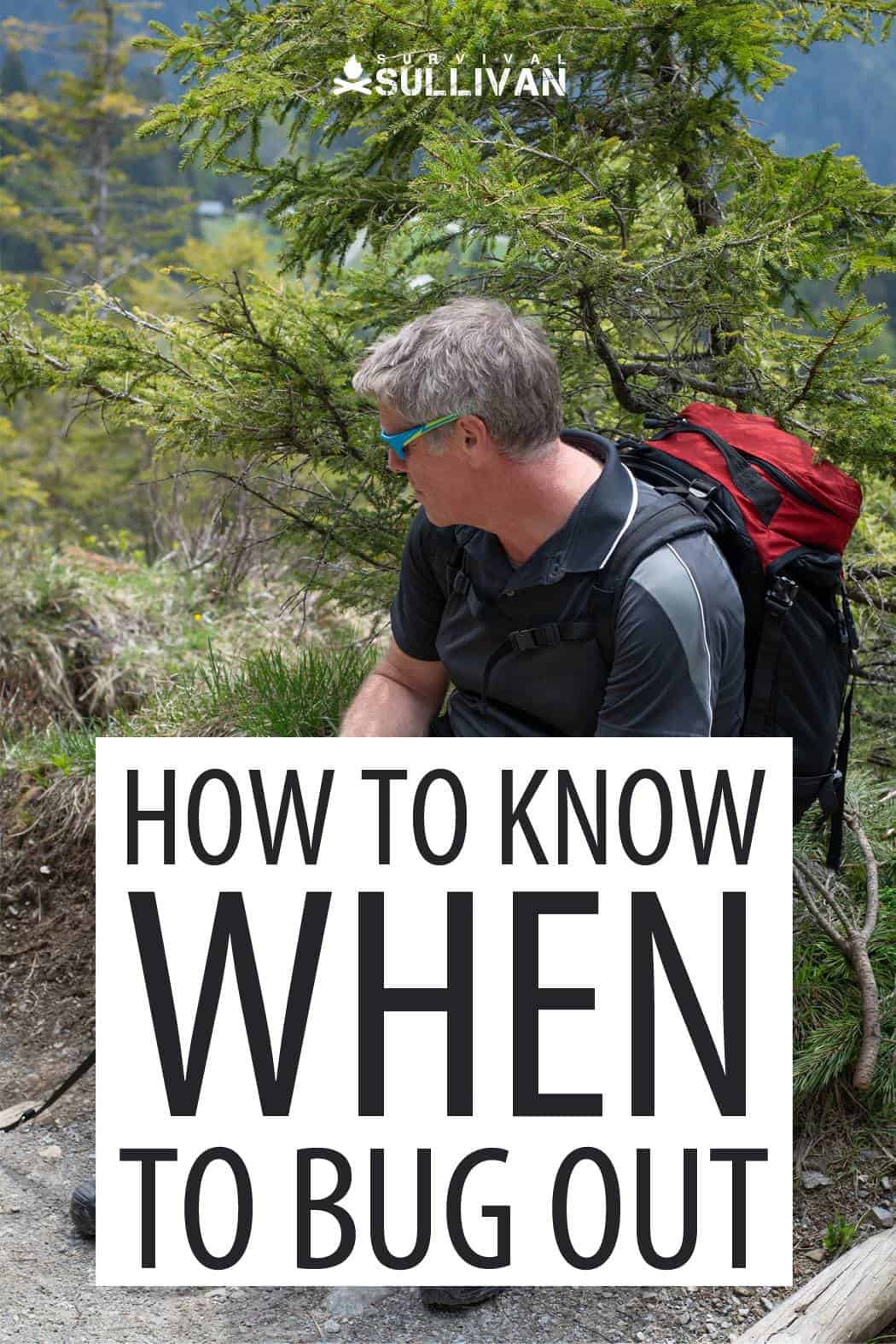When a long-term disaster strikes, it can be confusing to know what to do. You need to determine beforehand whether you will bug in or bug out. Unless you have a well-stocked bugout location and a means to get there safely, bugging in is, in most cases, your best option.
After all, home is where you are comfortable and you can easily stock it up and prepare it to weather the storm and defend it if needed.

Of course, bugging in isn’t the topic here, although there is plenty of information on bugging in.
This is because no matter how well you prepare for bugging in, there are situations in which bugging out is the better option, even if you don’t have a pre-designated bugout location stocked and ready to go.
The question that is asked by so many people is how to know when to bug out, and that is a very good question.
What Bugging Out Means
There are plenty of potential natural disasters that would force you from your home, but know that if a forest fire or Category 3 hurricane is bearing down on your home and you have to leave, you are not bugging out—you are evacuating.
These situations happen in a localized area and if you need to leave your home, you will be evacuated for your safety, in most cases prior to the event.
There will be first responders and government agencies that will help ensure public safety and you can assume that unless your home has been destroyed, you will be returning to it.
The difference between evacuation and bugging out is that the latter generally done with the understanding that you won’t be coming back.
The situation that has occurred is such that there are no first responders or government agencies to have your back and keep law and order.
The need to leave your home results because staying has become more dangerous than leaving. The question is, how do you know when this is the case?
Why Would You Bug Out?
If you are safe and you have everything you need, you aren’t going to bug out—at least you shouldn’t. It’s as simple as that.
However, there are two primary reasons why you would bug out—if your security and safety are compromised and/or you run out of resources and cannot replenish them. Let’s take a look at each of these.
Security
How secure and safe you are in your bug in location is the most important deciding factor in whether to stay or go. With the world falling apart outside, you are likely spending most of your time inside, particularly if you are well-stocked.
Assuming you have stayed, do you know what is happening out there? Do you know how dangerous things are, how dangerous your city or neighborhood is? You need to keep yourself informed so you will be better able to make decisions.
If law enforcement is gone and looters and gangs are roaming around, then you need to consider very carefully how defensible your home is.
Have you prepared your home to be secure against threats? Do you have a good line of sight, weapons, and the manpower to defend?
Do you have a community of neighbors you can work with to help defend each other’s homes? If the answer is no and the danger from other people becomes great, you might have to leave.
Resources
Perhaps you have remained safe and secure in your bug in location. If you have managed to stay under the radar, bury your trash, and avoid being noticed or have successfully been able to defend your home when needed, there will still come a time when you will run out of resources.
Maybe you had a source of water that has been used up. Maybe your food has been eaten and you have close to nothing left.
If you are in an urban center, it might have been looted and cleaned out, leaving no way to replenish your food and supplies. If you have nothing where you are, then you will have to go somewhere else to find what you need.
The question that remains at this point is how do you know when either of these things has become an issue? Essentially, you will need to know the signs to watch out for, the signs that will tell you it’s time to bug out.
Signs that Indicate when to Bug Out
This is not a black and white issue. Knowing when to bug out is a complex problem that depends on many factors, including where you live, your initial level of preparedness, and what is happening outside of your home and beyond.
To make a proper determination of when, and if, we will need to bug out, it is imperative that we assess the situation as best we can, and put everything into context according to our priorities.
It is difficult to overstate just how complicated this process can be, as everyone’s lifestyle, requirements and personal situation varies.
It is an easy thing to say if you don’t get out of disaster ‘X’ or event ‘Y’ you will die, but real life is rarely so cut and dry, no matter how terrible the situation seems.
Consider that a single man in good health and physically fit in his early 30s that has no dependence and no one else he is worrying about, will have far more flexibility in how, when and if he chooses to tackle the situation then another man of the same age who is in poor health, badly overweight, with multiple family members, including young children.
Similarly, people who are living with permanent disability, very old or otherwise infirm, and so forth might hedge their bets differently. Concerning your own personal context, consider the following factors:
Overall Condition
What is your overall level of fitness? Are you healthy, spry and fit as a fiddle, or are you showing some wear, tear and abuse?
Do you struggle with any persistent diseases, injuries or other maladies that could potentially affect your ability to self rescue or influence a positive outcome?
Strong, fit people are much harder to kill in any circumstances, and though you don’t always get a vote when it comes to the hand you are dealt physically, you must not be yes yourself when it comes to your current condition.
It is far better for someone who is physically infirm or weak to hedge their bets on the side of safety and get out early while the getting is good, rather than risk getting stuck in a situation that will turn into a grueling mudslog if they want to extricate themselves from it.
Contingency
Don’t consider things in a vacuum. If prepping teaches you anything, it should be that things can always get worse. The question you must answer is what will you do if “worse” happens to you?
You might be fine where you are, but what will you do if something unexpected happens that suddenly makes the situation untenable?
What if an elderly member of the family who is otherwise healthy suddenly needs critical medical care? What will you do if your supplies are lost or destroyed? Start thinking a few steps beyond the basic what if and plan accordingly.
This is where redundancy and durability of planning is essential. Also consider what will happen if you bug out and run into trouble along the way, or are for whatever reason forced to detour or double back.
What if you are forced to simply halt and take your chances where you are while underway to your destination? do you have the supplies, the know-how, and the grit to survive such an occurrence?
Contingency planning like this will only sharpen your decision making capability in a live event when time equals life. There may not be a truly good option, but there is always a “best” option.
Severity of Threat
There are plenty of situations that might see you bugging out, but the type, intensity and duration of the threat will significantly inform your decision on when and if you should bug out.
Consider a great example of this: hurricanes. For those of us who don’t live in coastal areas, the notion of not bugging out to avoid a hurricane and the attendant aftermath seems unthinkable.
But for those people who live in hurricane prone areas anything short of a direct hit by a significant storm is hardly worth getting upset over, right or wrong.
And as hard to believe as it sounds, it is true that, much of the time, a hurricane will only affect a wide area as badly as a severe thunderstorm system, with lots of wind, rain and some localized flooding.
Folks in these areas, fortunate as they are, might take their chances and ride it out or they might decide instead to bug out.
But people experiencing the same storm who live in the direct path of the eye or very near it have only one choice: Bug out, or roll the dice with your lives.
Other examples abound, and there is no simple stay-or-go list I can provide you with. Again, context is everything.
Very few events are certain to be absolutely lethal no matter what, and fewer still leave behind an aftermath that is completely unsurvivable.
Consider one of the most plausible and apocalyptic man-made scenarios, a nuclear exchange. As terrifying as it is to think about, only those people who live very near, comparatively, to the epicenter of the blast will be facing certain death.
If a nuke goes off several hundred miles away, you will not be affected by the blast at all, even though you will have to deal with the aftermath.
Ask yourself this. What are my chances when the event occurs, and what are my chances after it has passed?
Bug-Out Danger
It must be said that the bug out you plan to conduct in order to increase your safety and chances of survival might be the very thing that gets you killed! It’s true.
Bugging out is dangerous because you are leaving behind so many known conditions in exchange for a swath of unknown conditions and tons of variables.
There is so much that can go wrong when bugging out that it could make for an article, or several, all on its own.
You might be overtaken by the event you are trying to get away from. You could get lost, stranded or detoured without hope of picking your original path back up. You might be accosted by the desperate or the deranged, or by a predator, or merely a criminal.
Even if you get to your destination, or first waypoint, safe and sound there is no guarantee that your supply situation will support you for any length of time unless you have gone to considerable lengths in order to assure your sustainability.
Keep in mind, accepting the most dangerous, lethal situations you’ll be exchanging a considerable set of known factors for a large set of unknown factors that you will have to manage and problem solve on the fly.
It won’t be like going camping, and you’ll be putting your own life, as well as the lives of those you love, at risk with the decision. Don’t make the decision lightly!
Assessing the Situation
Your ability to get information on what is happening in your immediate area and beyond is critical when it comes to making the decision to bug out. Your primary means of determining what is happening is via the communications grid. You need to consider the following:
- Are communications still up and running?
- Provided you still have electricity (something we will discuss below), do you still have cell phone service?
- Are the television stations still operating and have they broadcast any public safety warnings?
- Are the AM and FM radio stations in your local area still broadcasting? Can you get any signals?
- If you have emergency or two-way radios, can you receive official alerts from the National Weather Service or other official channels?
If there are no communications, that is a sign that the disaster has far-reaching effects.
If you can’t find the information you need via television, phone, or radio, then you need to connect with another human being, preferably law enforcement.
But is law enforcement still functioning? When is the last time you spoke to or even saw a police officer or another first responder, such as an ambulance or the fire department?
For that matter, when is the last time you spoke with or saw anyone outside your home? Do you know what is going on in your neighborhood?
Have people been coming by and asking if you have any food or water? Have looters been seen in your neighborhood? Other things to consider include:
- Do you have electricity?
- Do you have water?
- Are stores, banks, and gas stations open?
- Are deliveries and pickups still being made? This includes mail delivery, deliveries to grocery stores, and garbage pickup.
Essentially, you need to find the answers to as many of the above questions as possible. The status of these situations will give you an indication of how bad things are on a local level and larger geographic scale.
If the answers to any or all of these last questions is no, then you know the situation is dire and you should at least consider whether it is safe to stay.
This is particularly true if the electrical grid has gone down, because without electricity, everything else grinds to a halt and chaos will erupt. You should also watch out for the following:
- Cars lined up at gas stations
- Long lineups at ATMs and in banks
- Lots of people buying up food, water, and supplies at the local stores
- Lots of people at hardware and building supply stores purchasing supplies to prepare for a disaster
- News reports of a potential threat
- An increased presence of police or the military appearing on your streets
Now, I am assuming you have done your basic preparation and you have food, water, and supplies at home, so you don’t need to go near all these lineups of panicking people, but you do need to be aware when a run on the banks and stores is happening, because while everyone else is trying to stock up, you can decide on your next move.
Being prepared ahead of time gives you the breathing room to think and decide what to do.
What about City Living?
I feel the need to mention this topic in the context of living in the city. In any major SHTF scenario, things will get dangerous quickly in the city. The city has a lot going against it during a long-term crisis, including:
- Lack of sanitation, in terms of sewage and trash build up
- Lack of water or water sources
- The quick spread of disease
- A larger concentration of people that will include gangs of looters and desperate people
- It will be difficult to hide the fact that you have what others do not
- Resources that are available will disappear more quickly due to the larger population
- The authorities might confiscate your preps to help the general population
- Difficult to get out of if you don’t bug out early
Ultimately, if you live in a city, you will have to bug out sooner, rather than later in most SHTF situations. The only way to survive is to have prepared ahead of time and ensure your bug in location is very heavily fortified and guarded.
Conclusion
The very best thing you can do for you and your family is prepare for both bugging in and bugging out. The greatest hope is that you will be able to bug in and stay put, but there is no way to predict how a SHTF event will play out.
You might have to get out of dodge quickly, so having a bug out plan and the food, water, and supplies needed for that scenario is critical.
Don’t get caught unprepared. Be ready to bug out and know the signs that it is time to leave. Most of all learn to listen to your gut.
I don’t mean make an emotional decision; I mean listen to your intuition if it tells you the situation is becoming too dangerous to stay.
Ultimately, only you will be able to make that decision, so be as prepared as possible to make the right one.

updated 04/07/2021

An urban prepper and rural wannabe, Karen has been working as a freelance writer for a decade and prepping for about half that time. She has gathered a wealth of knowledge on preparing for SHTF, but there is always more to learn and she has a passion for gathering and sharing that knowledge with other like-minded folk. Karen lives in London, Canada with her two children and plethora of cats.
